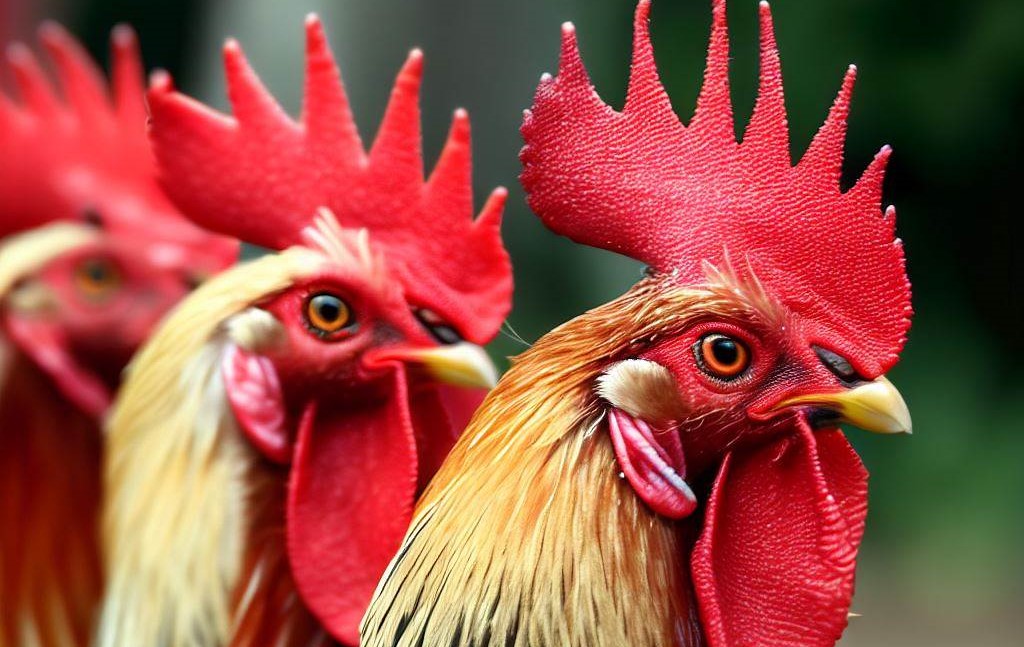Raising chickens without a rooster is a popular choice for many backyard hobbyists. In this comprehensive guide, we’ll explore the pros and cons of raising a flock without the crowing head of the roost. Whether you’re a seasoned chicken keeper or a newbie, you’ll find valuable insights in this article.
Why Consider Raising Chickens Without a Rooster?
Understanding the Role of a Rooster
Roosters play several roles within a flock, such as:
- Mating and fertilizing eggs: They ensure reproduction. This matters if you want more than just eggs. If you enjoy incubating your eggs, you will want a rooster. Of course, you can always buy fertilized eggs as an alternative.
- Protecting the flock: Roosters guard against predators by crowing, “Watch out, my friends, trouble’s a-comin’ “
- Maintaining a pecking order/crowd control.
- Calling the flock together: After an attack from a predator in a free-range situation the flock is usually scattered. When trouble has passed a rooster will crow to call the flock back together.
The Choice of Going Rooster-Free
The decision to go rooster-free often comes down to the following:
- Personal preferences and needs: Not everyone wants fertilized eggs or extra noise. Watching a rooster constantly chasing hens to mate with, and the act of mating, are disturbing activities for many people, myself included. Maybe you find feeding an extra head that doesn’t contribute to your egg count is an expense you don’t want
- Legal restrictions in some areas: Local laws might limit or prohibit roosters.
- Space considerations: Smaller spaces may not be suitable for roosters. The fewer hens that a rooster has to interact with the rougher those hens are going to look. The subsequent stress will result in lower egg production.
Pros of Raising Chickens Without a Rooster
Reduced Noise
Going without a rooster means:
- Comparison of noise levels: Hens are generally quieter. Sounds at or below 70 dB are considered safe for our hearing. That’s the sound of a normal conversation between two people. A rooster crows at around 130 decibels. I’m up and at ’em by 4:30 most mornings. I open the coop around 5:45. A little banty rooster screams every time I open the coop. Annoying? You bet, but it sure gets my blood moving.
- Impact on neighbors and local regulations: Less noise can be an excellent neighborly choice.
Easier Flock Management
Managing hens without a rooster is often simpler:
- Behavioral differences: No male aggression to deal with.
- Handling aggression among hens: Easier pecking order.
- Tips for managing a rooster-free flock: Include careful breed selection and monitoring social dynamics. In the absence of a rooster, a dominant hen will take his place sans the mating brutality A large friendly breed is a good choice for such leadership, ie the Brahmas.
Egg Production
Raising chickens without a rooster affects eggs:
- Fertility vs. non-fertility: Eggs won’t be fertilized.
- Production rate consistency: Hens will lay consistently.
- Quality of eggs: No significant difference in taste or appearance.
Cons of Raising Chickens Without a Rooster
Lack of Natural Protection
A rooster-free flock has challenges:
- Predators and security measures: You’ll need alternative protection.
- Implementing alternative protection strategies: Ideas include fences and guardian animals.
Absence of Fertilized Eggs
Without a rooster:
- Impact on breeding plans: You won’t be able to hatch chicks from your flock. Don’t “hire” a rooster to fertilize your hens. Birds from outside your flock can carry diseases that could decimate yours.
- Options for obtaining fertilized eggs if needed: You can purchase from reputable breeders. Some good examples are Cackle Hatchery and My Pet Chicken.
Potential Behavioral Changes in Hens
If you already have a rooster and decide to remove it from your flock, expect some changes:
- Social dynamics: Hens establish their own hierarchy.
- Pecking order alterations: Management might need adjustments.
- Managing behavioral challenges: Provide ample space and entertainment.
Practical Tips for Raising Chickens Without a Rooster
Here are valuable guidelines for success:
- Selecting appropriate breeds: Some breeds are better suited for a rooster-free environment. These include, but are not limited to the Leghorns, Australorp, Rhode Island Red, and the Barred Rock. And let’s not forget the Sex Links.
- Providing enrichment: Toys, perches, and treats keep hens happy.
- Addressing potential health issues: Regular check-ups are essential. Always be on the lookout for excessive lethargy, preening, egg-eating, and feather-picking to name a few symptoms to watch for.
Cockadoodle-done
Raising chickens without a rooster has pros and cons, each impacting the flock differently. From noise considerations to flock dynamics, the choice depends on individual goals and preferences. Experimenting and finding what works best for you and your flock is part of the joy of chicken keeping.
Thanks for reading. I’m always interested in what you think about my topics here at Chickenmethod.com. Drop me a line if you would be so kind.
Dave
Chickenmethod.com




Well thank you I have a chicken coop and I have been thinking of getting a rooster to put in with the chickens I get but everyone else doesn’t want to hear him in the morning. So thank you so much for telling me the pros and cons of cons of a rooster.
You’re very welcome, Paul. My rooster wakes up at the crack of dawn to start crowing, then a few times a day after that, but never at dusk. Happily, my neighbors are close enough to here him but far enough so it doesn’t bother them (they say:)
A couple of breeds that are on the quieter side are Barred Plymouth Rocks and Silkies.
I wish you well with your flock. Take care.
Dave